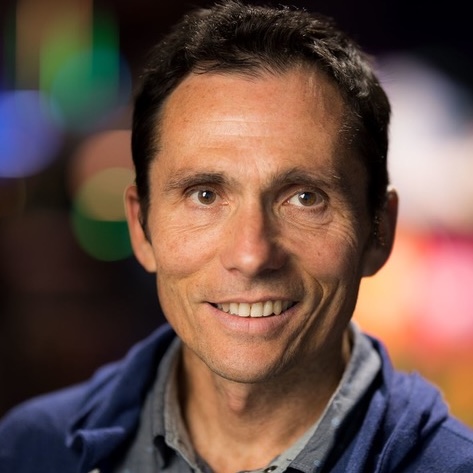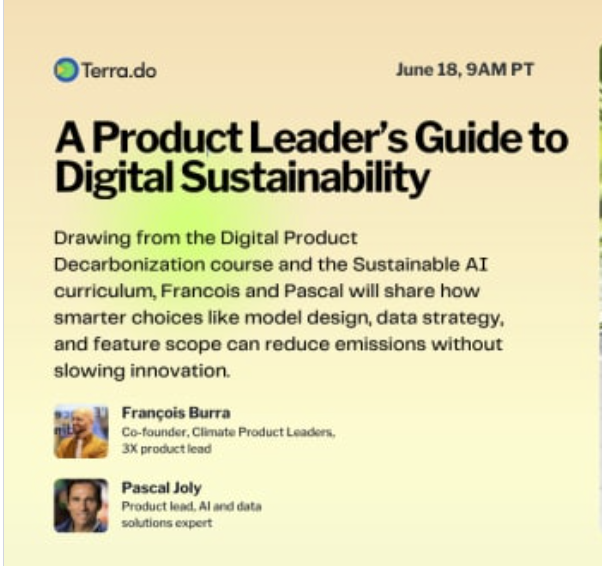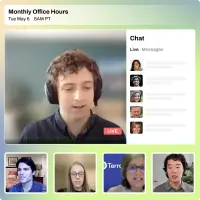Sustainable AI
This four-week course equips you with tools, and strategies to mitigate AI’s climate impact, optimize AI products for sustainability, and implement responsible, energy-efficient AI technologies


Created by —
François Burra
Co-founder, Climate Product Leaders, 3X product lead
Pascal Joly
Product lead, AI and data solutions expert
Introductory level
Some knowledge of programming and data science recommended but not necessary
Flexible schedule
Learn according to your schedule with fully asynchronous learning
3 weeks / 4 hours per week
Expected commitment. We will help keep yourself accountable with timely check-ins
Certificate & Office-hours
NewCertificate and office-hour meetings with course creator and other learners
Course overview
AI is projected to account for 50% of the Internet’s energy consumption by 2050, an increase from less than 1% today. Large language models (LLMs) already drive significant energy use in data centers globally, with demand rapidly increasing. This course offers actionable strategies for product managers and seasoned professionals to develop and implement AI products sustainably.
We’ll begin by examining the climate impacts and risks associated with AI. From there, we’ll explore sustainable AI principles, including sufficiency and efficiency, and their real-world applications. You will also learn essential tools for measuring sustainability and the ROI of adopting sustainable AI practices.
Throughout the course, you’ll engage with metrics and methodologies to make informed, climate-forward decisions when adopting and implementing AI technologies. By the end, you’ll be equipped with the knowledge and network to drive sustainable AI initiatives within your organization.

Skills you will learn
AI measurement and reporting
Measure and optimize the climate impact of digital technologies
AI use case fit
Assess when AI is appropriate and when alternatives are more sustainable
AI product design
Design AI solutions with minimized environmental impact
AI cloud engineering
Implement best practices to reduce AI’s environmental footprint in the cloud
Who is this course for?
Digital builders
Gain expertise in embedding environmental sustainability into AI projects, from data collection to model deployment
Leaders, executives, and VPs
Lead with sustainability in mind, craft strategic initiatives, and implement policies that reduce AI’s environmental impact
Sustainability and ESG professionals
Understand AI's climate impact and identify effective strategies to reduce those impacts, ensuring alignment with broader sustainability goals and ESG frameworks
Course syllabus
Welcome and introduction to sustainable AI
Readings/viewing: The environmental impacts of AI, Emissions sources of digital products, Distribution of emissions in AI applications, Measuring emissions from AI
Sustainable AI principles
Readings/viewing: When to leverage AI (and when not to), Sufficiency vs. efficiency, Prioritizing and choosing the right AI, Measuring ROI of sustainable AI.
Sustainable AI principles
Readings/viewings: Energy efficiency in model training and inference, Sustainable infrastructure choices, cloud providers, and data centers, Engaging stakeholders on AI sustainability principles

A Product Leader’s Guide to Digital Sustainability
Join François Burra, author of Sustainable by Design: A Playbook for Product Managers, and Pascal Joly, Sustainability Tech expert, for a practical session on building products that prioritize the planet.
You won't learn alone
Join monthly live office hours with the course creator and fellow learners.
- Ask your questions live
- Get direct feedback from the instructor
- Connect with peers taking the course with you
- Learn from others' questions
- Get access to the recording if you miss it
- Keep lifetime access

What you get with with this course
Free office-hours
Join monthly live sessions with the course creator and peers taking the same course.
Global community
Join our global community of 5k+ professionals from 80+ countries with 200+ expert mentors
Live events & workshops
Attend immersive events and practical workshops with top climate voices and peers
15% off other courses
As a learner, you get 15% off for all other courses on Terra.do. Including our cohort-based courses.
AI-assisted learningBeta
Cutting-edge AI-assisted learning experience with personilzed pathways and more.
Meet the course creators

François Burra
Co-founder, Climate Product Leaders, 3X product lead
François is a sustainable digital and low-carbon product consultant, mentor, and speaker with several successful turns as a Product Lead and UX Designer and 15 years of experience working with startups and agencies in Canada and the US. He helps digital companies reduce their digital emissions by delivering training, measuring digital emissions, and creating low-carbon experiences. He has trained individuals and teams in a variety of organizations such as Huge, ServiceNow, Planes, fruggr, Accenture Song, Cossette, etc. He recently wrote the climate product playbook “Sustainable By Design: A Playbook for Product Managers”. François is also a Terra.do fellow, completing Climate Change: Learning for Action in 2022

Pascal Joly
Product lead, AI and data solutions expert
Pascal Joly is an experienced product leader with 25 years of experience in IT services and digital product development for large companies. He is the founder and owner of IT Climate Ed, providing consulting and education services in digital sustainability. He holds a certifications in Machine Learning and LLMs, is a graduate of the INRIA Environmental Impacts of Digital Technologies program, a Terra.do fellow and is certified in GHG Scope 3 measuring.
Frequently Asked Questions
Q: Who will benefit most from this program?
Q: What does lifetime access mean?
Q: Can I connect with other learners or the instructor?
Q: Is the course material up to date?
Q: How is the Terra.do experience different compared to others?
Q: Will this course help me find a climate job?
Q: What is the format of the course?
Q: What happens if I miss the live office hours?
Q: Can I expense this through my employer?
Take this course
Sustainable AI
One-time purchase. Lifetime access. Free live office hours.
Learn the skills and find the community to work on climate
Take expert-led courses, join a global network, and work on real climate solutions.
Carbon Offsets Foundations
Gain a foundational understanding of carbon offsets, their role in reducing greenhouse gases, and how they differ from removals. Explore...
Supply Chain Decarbonization
A four-week course on strategies to measure and reduce carbon emissions and enhance the resilience of complex supply chains in...
Leveraging Data and AI in Sustainability
A four-week online course focused on scaling data use to accelerate sustainability initiatives, developing a fit-for-purpose data and AI strategy...
Mastering Corporate Climate Reporting
Four-week course covering climate-related financial disclosures and reporting requirements that have increasingly become mandatory in markets across the world.
Economics of Climate Change
This course provides a deep dive into the economic dimensions of climate change, exploring both theoretical foundations and real-world applications....
Local Impacts and Extreme Event Attribution
Understand how local weather events and climate change are related. Explore this relationship between local impacts and climate change and...
